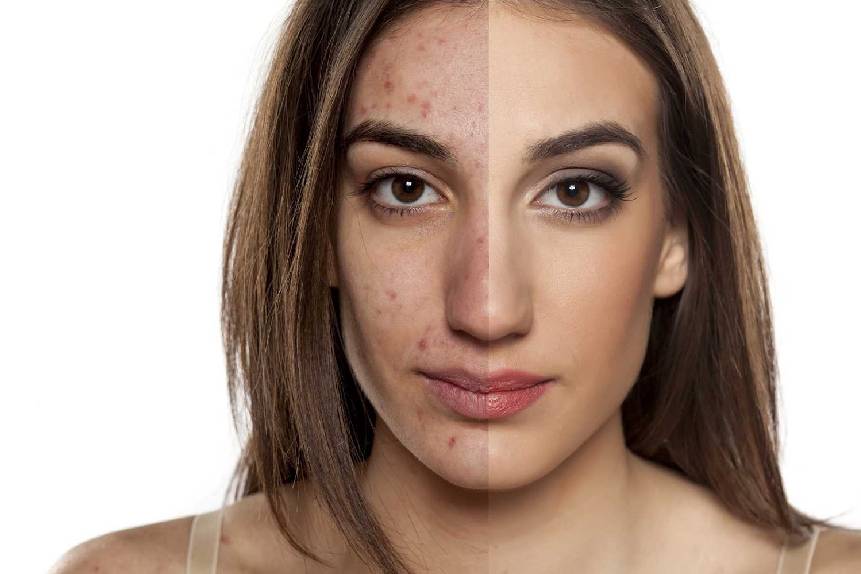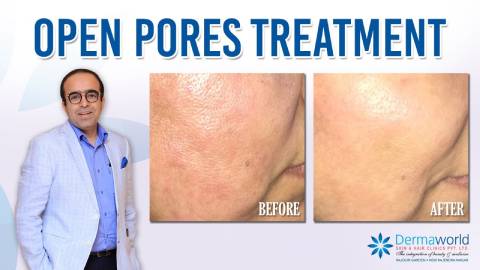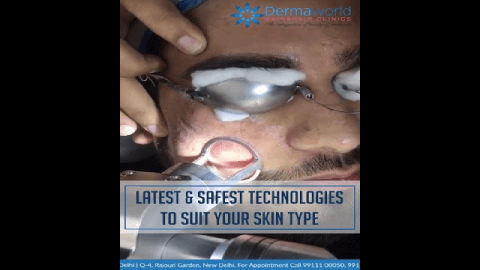
Trying to get rid of acne scars?
- Steroid creams, silicone gels, cryotherapy, dermal filler injections, help to shrink and flatten the scars. These are often recommended to prevent keloids and hypertrophic scars.
- Laser resurfacing: In laser resurfacing technique, the laser beam is used to heat the skin layers underneath to promote collagen production. This makes the skin smooth and more even in appearance.
- Chemical peels: This method helps to get rid of excess pigmentation, skin lesions, and acne scars. It offers great results with no downtime. About 4-5 sessions are required to achieve optimum results.
- Consult Dr. Rohit Batra best skin specialist for acne scars treatment in Delhi, India at affordable cost !
Acne Scar Treatment in Delhi - Dr. Rohit Batra
Acne scarring is a common side effects of acne breakouts which occurs as a result of damage to the skin during the healing of active acne, says Dr. Rohit Batra Best Acne Scar Treatment doctor in Delhi, India. A scar is the body's response to healing the wound, in which the skin cells combine with the connective tissue, and cell multiplication takes place to repair the damage. Acne scars also develop because of the post-inflammatory hyperpigmentation and form red, black, and brown discolouration of the affected skin surface. Some scars may resolve on their own, but mostly these disfiguring marks do not resolve without treatment.
Types of Acne Scars
There are two types of acne scars depending upon there whether there is a net gain or loss of collagen.
1. Atrophic scars: These scars develop when there is loss of tissue, and when enough fibroblast or connective tissue is not made during the healing period. These scars appear like small depressions in the skin. These are further divided into:
1.1. Icepick: These types of scars are deep, narrow, sharp, and vertically extend deep in the dermis or subcutaneous tissue.
1.2 Boxcar: These types of scars have oval to round depressions and have vertical edges that are sharply demarcated.
1.3 Rolling scar: They appear as sunken or wavy areas on the affected area, and lack sharp borders. These are formed when a fibrous band of tissue develops between the skin and subcutaneous tissue.
2. Hypertrophic and keloid scars: These types of scars are typically pink and raised in appearance. These are produced due to excess collagen production and deposition with decreased collagenase activity.
These occur in the original site of injury that contains thick hyalinized collagen bundles. Keloids occur in the form of reddish-purple nodules and papules, and it often grows beyond the border of the original wound.
Dermabrasion/Microdermabrasion
Dermabrasion facial resurfacing technique, removes the epidermis and penetrates at the level of the reticular dermis. It promotes remodelling of the skin’s structural proteins. Microdermabrasion process accelerates the natural process of exfoliation, by removing the outer layer of the epidermis. These techniques improve the skin texture and also effectively treat acne scars.
The best way to get rid of acne scars is to avoid them in the first place and taking proper precautions and treatments for treating acne-prone skin.
Visit Dermaworld Skin Clinic for the best treatment of Acne Scars in Delhi, India at an affordable cost.
Book An Appointment
ALL CLINICS CLOSED ON SUNDAY
Frequently Asked Questions
In most cases, acne scars are permanent and do not improve on their own. However, the appearance of these scars can be reduced to a certain extent, with the medical intervention from a qualified dermatologist. Depending upon the type and severity of the scars, the dermatologist might recommend steroid creams, silicone gels, etc. However, some advanced skin treatments can also help to smoothen the appearance of acne scars such as
- Dermal filler injections
- Cryotherapy
- Laser resurfacing
- Chemical peels
- Dermabrasion/Microdermabrasion
- Laser toning
- Subcision
- Microneedling
To get rid of acne scars, it is essential to seek consultation from a dermatologist. They are qualified in treating different skin conditions and provide apt treatment for the same. After a physical examination and certain skin tests, they will be able to determine the type of acne scars and the right treatment that will produce useful results. One must take the full course of the treatment and religiously apply the creams or gels as per the recommendation of the dermatologist. However, advanced acne treatments show faster results than topical applicants. These treatments include subcision, laser skin resurfacing, microneedling, dermal fillers, laser toning, chemical peels, and many more. However, to obtain best results, multiple sessions are recommended.
Vitamin C is a powerful antioxidant that stimulates collagen production, reduces discoloration, and increases the skin's healing ability. The regular application of Vitamin C can help to reduce the appearance of dark spots and redness, but it has minimal/no impact on the deep pitted acne scars. These permanent acne scars can be effectively managed with the help of advanced skin treatments, which are customized according to the type of acne scars and the patient's skin type. However, Vitamin C can be combined with these skin treatments for enhanced results.
Acne scars can vary in size, type, and severity. These scars can either appear as depressed or raised. The acne scars are mainly divided into two categories :
- Atrophic scars
- Hypertrophic scars
Atrophic scars appear as a result of loss of collagen during the healing process of acne. Therefore these look slightly depressed on the surface of the skin. The atrophic scars are further subdivided into three categories.
- Boxcar scars (boxlike depressions with sharply defined edges)
- Ice pick scars (narrow indentations)
- Rolling scars (wavy and uneven depressions)
Hypertrophic scars appear when the skin produces excess collagen during the acne healing process. These are slightly raised above the skin and are known as keloids.
Acne scars are a product of inflamed lesions, such as cyst, pustule, or papule. The inflammation arises when the pores get clogged with excess oil, dirt, dead skin cells, and bacteria. The swelled up pores break the follicle wall. If the rupture happens near the skin's surface, then mild scarring occurs, whereas more severe lesions occur when there is a deep break in the follicle wall. The greater the inflammation, the more likely that the scarring will occur. Deep breakouts take much time to heal, which increases the risk of acne scars. Therefore, it is recommended to find treatment at the earliest from a dermatologist, and one should also avoid squeezing and popping pimples.
Subcision is a simple and effective procedure to raise the depressed acne scars for a smoother appearance. In this procedure, a small needle is utilized to break down the scar tissues to stimulate collagen and reinvigorate cell turnover. This helps to relieve the depression, which leads to reduced appearance of the scar. Most of the patients find results after the first session itself. However, the number of sessions will depend upon the depth, severity, and span of the acne scar. On an average, the patient requires around 3-6 sessions to see a significant change.
Rolling scars are depressed, which occur as a result of the acne healing process. These are defined by sloping edges, which make the skin a little wavy. They tend to be shallower than other types of scars. These are a result of long-term inflammatory acne. These become more visible with age due to lost skin elasticity.




